/slanted
Wholesale $15.65 + GST
RRP $30.00
ISBN 9781991154163
A field guide to the spirit and endeavours of Edwardian mountaineer Freda Du Faur (1882–1935), the first woman to summit Aoraki Mount Cook, the highest peak in the Southern Alps of Aotearoa New Zealand. Through flights of verse, pages of concrete visual poetry, and fragments of archival materials, this new collection is glistening with newness on every page.
Alison Glenny’s Antarctic-themed collection of prose poems and fragments, The Farewell Tourist, won the Kathleen Gratton award for poetry and was published by Otago University Press in 2018. In 2019 she was an Ursula Bethell writer in residence at the University of Canterbury. She lives on the Kāpiti Coast.
Published by Compound Press
November 2024
Soft cover, 84 pages
148x210mm, upright
Wholesale $15.65 + GST
RRP $30.00
ISBN 9781991154163
A field guide to the spirit and endeavours of Edwardian mountaineer Freda Du Faur (1882–1935), the first woman to summit Aoraki Mount Cook, the highest peak in the Southern Alps of Aotearoa New Zealand. Through flights of verse, pages of concrete visual poetry, and fragments of archival materials, this new collection is glistening with newness on every page.
Alison Glenny’s Antarctic-themed collection of prose poems and fragments, The Farewell Tourist, won the Kathleen Gratton award for poetry and was published by Otago University Press in 2018. In 2019 she was an Ursula Bethell writer in residence at the University of Canterbury. She lives on the Kāpiti Coast.
Published by Compound Press
November 2024
Soft cover, 84 pages
148x210mm, upright
Wholesale $15.65 + GST
RRP $30.00
ISBN 9781991154163
A field guide to the spirit and endeavours of Edwardian mountaineer Freda Du Faur (1882–1935), the first woman to summit Aoraki Mount Cook, the highest peak in the Southern Alps of Aotearoa New Zealand. Through flights of verse, pages of concrete visual poetry, and fragments of archival materials, this new collection is glistening with newness on every page.
Alison Glenny’s Antarctic-themed collection of prose poems and fragments, The Farewell Tourist, won the Kathleen Gratton award for poetry and was published by Otago University Press in 2018. In 2019 she was an Ursula Bethell writer in residence at the University of Canterbury. She lives on the Kāpiti Coast.
Published by Compound Press
November 2024
Soft cover, 84 pages
148x210mm, upright
Praise for /slanted
/slanted is to me three things: one; a finely-made poetry of the eye, which becomes simultaneously and intensely a poetry of the ear and the echo, two; an historical poetry interested in the language of prior texts, and three; a deeply civilisational poetics, because it approachesEnglish through a non-Western and anti-imperialistic lens. Combining these three things, Glenny is a marvellous and challenging Antipodean experimentalist.
—A.J. Carruthers
Glenny is as devoted to the ridges and valleys of the line and letter as her collection’s real-life muse and subject, climber Freda Du Faur, is to scaling the peaks. /slanted brings together paraphrase, erasure, shape and LANGUAGE poetry in an elliptical, challenging book. This is poetry that knows the power of form—of ordering, arrangement, selection—a collection that knows the power of placing one foot after another.
—Jake Arthur
/slanted feels created by hand and by foot. The hardened heels, the ice-cut steps and the glacier-wear (in this case, skirts!) are palpable, while the snow and stalactites and steep-angled slopes sprawl like obstacles across the page. Through it all, Freda Du Faur treads slowly over two-faced mountains, a “sporting female” battered by altitude and her time in history, straining to see but never knowing what she means to us now. Climbing becomes poetry, and poetry a way of climbing up and out of the past.
—Laura Williamson
Praise for The Farewell Tourist and Bird Collector
“This collection is a beautiful snowfall that leaves you cold and reaching for warmth. It is a stunning achievement and a successful experiment with language and form.”
“This poem twists language and undresses the assumptions we have about meaning.”
—essa may ranapiri
